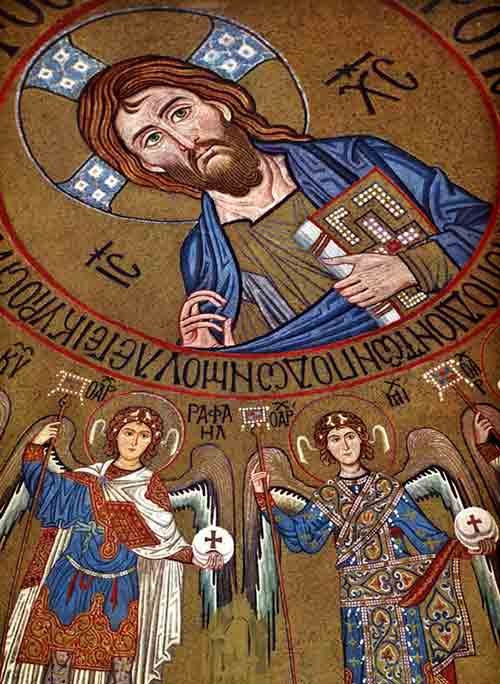
Let us pray (in silence) [that we grow into Christ’s new life]
pause
O God,
from whom all good things come,
grant that,
by your inspiration,
we may discern what is right,
and by your merciful guiding may do it;
through Jesus Christ
who is alive with you,
in the unity of the Holy Spirit,
one God, now and for ever.
Amen.
The above is my reworking for my Book of Prayers in Common in which I seek to provide a set of collects with history and commentary.
Christians have been praying the above prayer on the equivalent of the Sixth Sunday in the Great Season of Easter for over 12 centuries – shared through the Reformation into the Roman Missal and Books of Common Prayer. Then, after Vatican II, it was moved to the rarely-celebrated 10th Sunday in Ordinary Time, a Sunday that is normally eclipsed by the Easter Cycle and we won’t meet again until 2035.
For commentary, including how this engages with the surrounding Platonic and Aristotelian thought, as well as its connection with this coming Sunday as “Rogation Sunday” read further at: Sixth Sunday of Easter, or below.
NB: Ascension Day, Thursday 26 May 2022 is NOT the end of the Easter Season. Ascension Day is a celebration within the Easter Season, emphasising a dimension of the Easter reality.
Any comments, suggestions, resources, of course, are welcome below in the comments section.
Resources beyond this site:
Textweek
Resourcing Preaching Down Under
Girardian Reflections on the Lectionary
Commentary on the Collect
From the Gelasian sacramentary (#556) and the supplement to the Gregorian sacramentary (#1123) through the Sarum Missal and Books of Common Prayer to the 1962 RC Missal this was the collect for the (equivalent of the) Sixth Sunday of Easter. In 1975 Roman Catholics moved it to the (rarely occurring) 10th Sunday in Ordinary Time. [The next time we encounter the 10th Sunday in Ordinary Time is 2035. It is usually eclipsed by the Easter Cycle]. The collect is also used at the 10th Sunday in Ordinary Time in The Episcopal Church (where that Sunday is called Proper 5).
The original is:
Deus a quo bona cuncta procedunt, largire supplicibus tuis ut cogitemus te inspirante, quae recta sunt, et te gubernante eadem faciamus.
The Gelasian Sacramentary omits “tuis” and the Roman Catholic Church slightly rearranged the wording after Vatican II:
Deus, a quo bona cuncta procedunt, tuis largire supplicibus, ut cogitemus, te inspirante, quae recta sunt, et, te gubernante, eadem faciamus.
Cranmer for the 1549 BCP translated it as:
LORDE from whom all good thynges do come; graunte us, thy humble servauntes, that by thy holy inspiracion wee maie thynke those thynges that bee good, and by thy mercifull guydyng maye perfourme the same; thorow our Lorde Jesus Christ.
The Sixth Sunday of the Great Easter Season is traditionally “Rogation Sunday,” the Sunday before Monday, Tuesday, and Wednesday that precede Ascension Day, when, with prayer, fasting, and processions God is asked for a good harvest, protection against natural disasters, and forgiveness of sins. There are overtones of this in today’s collect, as well as of James 1:17:
Every generous act of giving, with every perfect gift, is from above, coming down from the Father of lights, with whom there is no variation or shadow due to change.
The collect engages Platonic and Aristotelian ideas. Platonists have the perfectly transcendent One overflowing through descending triads of intermediaries down to our corrupt material world from which we must be freed. For Christians, it is Christ, in incarnation, death, and resurrection who comes from God into this imperfect world, and takes us, and with us all creation, back to God.
The Aristotelian idea of how we become good is by repeated performance of good acts. For Christians, it is God who declares us good, and thus enables us to do good.
Procedere means to proceed.
Largire to confer, bestow, grant
Recta translated by Cranmer as “good” (“thynke those thynges that bee good”) actually is that which is right, good, virtuous, uprightness, rectitude, virtue. It has a moral dimension, referring to what is ‘above.’
Cogitare is not merely ‘to think.’ It is closer to its English derivative, ‘cogitate.’
(RC) ICEL 1973:
God of wisdom and love,
source of all good,
send your Spirit to teach us your truth
and guide our actions
in your way of peace.
BCP TEC:
O God, from whom all good proceeds: Grant that by your
inspiration we may think those things that are right, and by
your merciful guiding may do them; through Jesus Christ our
Lord, who lives and reigns with you and the Holy Spirit, one
God, for ever and ever. Amen.
In the failed 1998 English Missal translation:
Almighty God,
from whom every good gift proceeds, grant that by your inspiration
we may discern those things that are right and, by your merciful guidance, do them.
We ask this through our Lord Jesus Christ, your Son,
who lives and reigns with you in the unity of the Holy Spirit, God for ever and ever.
ICEL 2011:
O God, from whom all good things come, grant that we, who call on you in our need, may at your prompting discern what is right, and by your guidance do it.
If you appreciated this post, consider liking the liturgy facebook page, using the RSS feed, and/or signing up for a not-very-often email, … – if you are on Instagram, please follow @liturgy.


